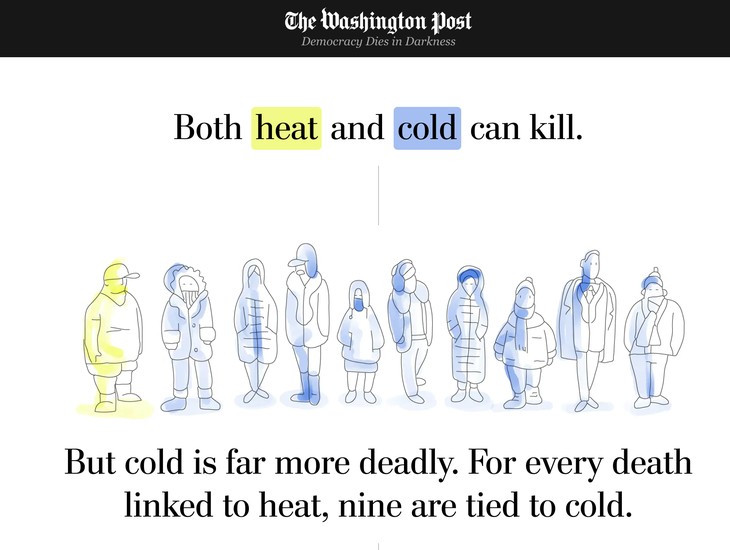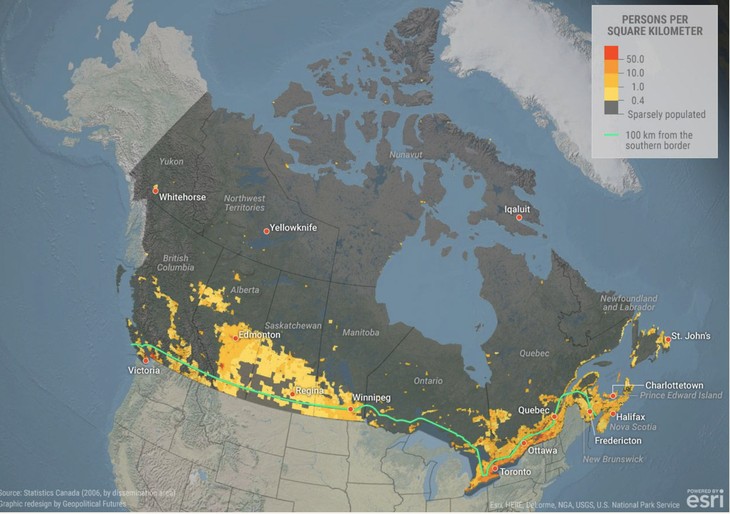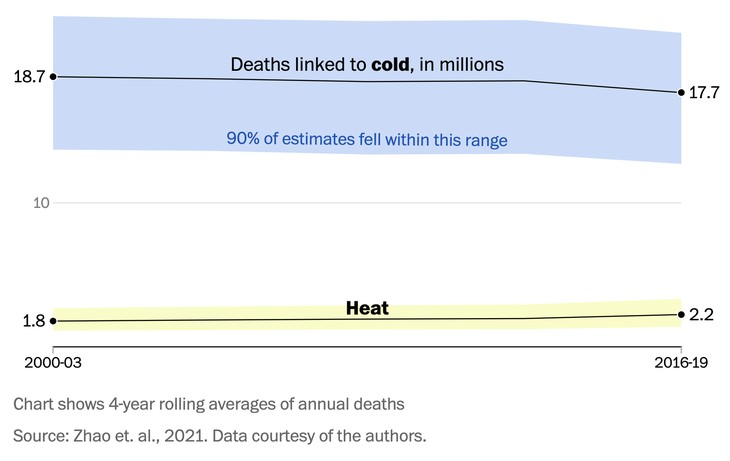Yesterday I wrote a piece accusing the Washington Post of outright lying about Elon Musk‘s rumored tantrum that led to an algorithm tweak that put his tweets at the top of everybody’s timeline. They also complained that he was focused on fixing problems with the platform that bugged him the most.
The sources were disgruntled Twitter employees and especially ones that Musk had fired. They never bothered to ask Musk himself about the story, and he denied it. More importantly, people who actually use Twitter denied it, including me. It never happened. It was a classic example of how reporting standards have gone down the tubes.
In fairness, today I want to praise the Post for doing something right, contrary to the narrative that we find all too frequently in the MSM.
On Thursday the Post published a story from one of their climate columnists about the relative dangers of heat and cold to human well-being. Taking for granted that the climate is warming, author Harry Stevens did a perfectly fair job of exploring the relative costs and benefits to humanity. He told the inconvenient truth that a warming planet would on balance lead to fewer temperature-related deaths, by a very large margin.
The reason? Excessive cold is far more deadly to human beings than excessive heat. Common sense alone would convince you of this even if the statistics didn’t. All you have to do is look at the distribution of the human population in the world to see where people cluster, and it isn’t in colder places. Civilization itself was born and flourished in places far warmer than where the climate fanatics live, and nobody moves north to retire.

I grew up in Tucson, AZ. I know that heat can kill, especially if you dehydrate. I now live in Minnesota, where at times your exposed skin can get frostbite in 30 seconds to a minute.
Look at a population map of Canada and it reminds you of the famous photo of the Korean peninsula at night. All the “light” (population) is in the south.

Still, this obvious truth is rarely acknowledged in the MSM or by politicians because it is quite inconvenient for their purposes. People who are not alarmed by a supposed “climate crisis” have pointed these facts out numerous times, including me. We are excoriated for it.
So when the Washington Post does an entire story on the matter, it’s important to sit up and take note.
Stevens is not conceding that climate change is not a problem, but he is at least fairly acknowledging reality. This is so rare these days that it deserves praise.
The scientific paper published in the June 2021 issue of the journal Nature Climate Change was alarming. Between 1991 and 2018, the peer-reviewed study reported, more than one-third of deaths from heat exposure were linked to global warming. Hundreds of news outlets covered the findings. The message was clear: climate change is here, and it’s already killing people.
But that wasn’t all that was happening. A month later, the same research group, which is based out of the London School of Hygiene and Tropical Medicine but includes scientists from dozens of countries, released another peer-reviewed study that told a fuller, more complex story about the link between climate change, temperature and human mortality. The two papers’ authors were mostly the same, and they used similar data and statistical methods.
Published in Lancet Planetary Health, the second paper reported that between 2000 and 2019, annual deaths from heat exposure increased. But deaths from cold exposure, which were far more common, fell by an even larger amount.
All told, during those two decades the world warmed by about 0.9 degrees Fahrenheit, and some 650,000 fewer people died from temperature exposure.

On the net, climate change saved lives.
Stevens acknowledges these facts and turns his focus to equity. People who live in warmer areas also tend to be in poorer areas, so perhaps the distribution of lives saved to lives lost disproportionately affects poor people more. Before you scoff about DEI, who pays for net benefits does matter.
Projecting such things is, shall we say, difficult. Given how poorly climate models have matched reality we are right to be skeptical about projections. With that caveat, a study made a stab at predicting the distribution of temperature-related deaths in the future.
What about the long term? A groundbreaking peer-reviewed study, published in November in Harvard’s Quarterly Journal of Economics, gives us a glimpse. In the study, a team of researchers projected how mortality from temperature would change in the future.
The worldwide temperature-linked mortality rate is projected to stay about the same, but you can see enormous geographic variation: colder, wealthier countries do well, while hotter, poorer countries suffer….
In the medium emissions scenario, Niger, one of the poorest and hottest countries in the world, is projected to suffer the largest increase in temperature-linked mortality, while cold, wealthy Finland sees the largest decrease. That pattern was common, said Michael Greenstone, a University of Chicago economist who co-authored the study.
Greenstone, who over a decade ago helped the Obama administration calculate the “social cost of carbon,” a measure of the damages caused by each ton of carbon dioxide released into the atmosphere, was struck by the unfairness the results implied. “Taking $100,000 from a poor person wouldn’t be equal and opposite to how you feel about giving $100,000 to Elon Musk,” he told me. “I think that’s the underbelly of the climate problem.”
To me, the most interesting point is that Niger is facing this possible future not primarily because it will get a bit hotter, but because it is so poor. And a slight increase in heat-related deaths would be dwarfed by the larger problem of all deaths caused by its seeming insoluble poverty.
So if helping people in Niger is your goal, focusing on carbon emissions is a pretty stupid way to do that. Helping people in Niger become wealthier by having a better economy would help not just with climate-related deaths, but deaths from all causes.
Niger is suffering from armed conflict, has one of the worst healthcare systems in the world, and I would wage a good bit that most people who live there would be more worried about those facts than the temperature outside any given day. Whether the temperature is 99 or 101 on any given day is hardly the highest priority problem they face.
But apparently, it is the one most significant to climate activists, apparently.
This is what is so frustrating about the obsessive focus on climate. It simply isn’t nearly as important a problem as so many others, and a small fraction of the resources devoted to climate mitigation devoted to higher-priority problems would make a far bigger difference to people.
Climate change is a classic first-world problem. It is as significant in the grand scheme of things as the relative screen quality of LCD or OLED screens on your TV, compared to people dying from preventable diseases or not.
In any case, I applaud the Post for printing this story. Not because I agree with everything in it–I don’t–but because it is fairly presented and confronts an inconvenient truth.
Kudos.









Join the conversation as a VIP Member